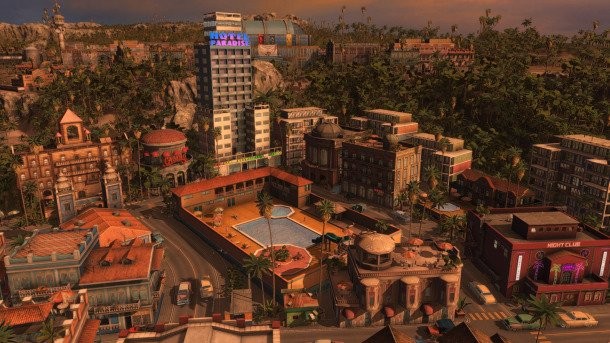Tropico 3 Review
I’m sure there’s some selection bias at work here, but I can’t help but think that Europe stepped up over the last year in triple-A game development. Tropico 3 is the latest in a string of great titles coming from across the pond. This city simulator leverages incredibly detailed political and economic models to create engaging gameplay while simultaneously providing a terrific sense of place with its outstanding presentation. A steep learning curve, limited tutorial, and poor documentation set a high barrier to entry – which is well worth overcoming in order to experience what Tropico 3 has to offer.
Unlike many city sims, this doesn’t worry the player overmuch about creating complex housing districts with access to a set of goods and services in order to get your citizens to build better, more lucrative dwellings. Tropico concerns you with building an infrastructure that allows your subjects to get on with their lives without too much fuss. If you supply them with jobs and the rudimentary services they need and/or want, they’ll go about their business while you worry about how best to spend their tax dollars. Building the bones of a prosperous society is an entertaining puzzle in itself, but that’s only a single gameplay vector.
Feeding The MassesThe campaign’s many scenarios offer varied challenges within Tropico’s massively complex set of interrelated systems. One mission sees you on an infertile island with a city to feed. You can delay industrialization to build up a fish and livestock food economy (and very possibly go broke in the process), or accept an offer of humanitarian aid. Letting those dirty foreigners on your sovereign soil is a slap in the face to the nationalistic and military factions of your people, though. Plus, a stream of refugees is seeking asylum in your country – more mouths to feed, but you’ll look like quite the autocratic *** if you close your borders. The constant pressures to make money by exporting goods and to offer better churches, schools, and medical care never relent during any of these crises. |
Ruling Tropico requires making a number of big-picture decisions: what kind of crops to grow, whether to hire trained foreign workers for specialist jobs or rely on immigration, and the appropriate level of kowtowing to U.S. and U.S.S.R. interests are just a few examples. A whole slate of edicts that range from mandatory education to requiring special building permits (which naturally funnel into your personal Swiss bank account) are at your disposal. Shaping domestic and foreign policy via these and other measures is critical to maintaining a stable state. Internal factions like communists, intellectuals, and religious folks get restive when their interests aren’t catered to, and gross neglect of your peoples’ desires will eventually lead to armed rebellion. It’s a good thing you thought ahead and kept your generals happy and guard posts equipped, right?
The depth and breadth of your options and the systems that they impact goes far beyond these simple examples. A well-funded secret police force can identify and make troublemakers “disappear” before talk of revolution gets out of hand. Different crops grow best in certain conditions, and support different types of industry. Increasing workers’ wages and improving their working conditions can be a great tool for maintaining order and attracting talent, but comes with a stiff price tag. If you want, you can even jump into direct control of your avatar and walk among the people, put down rebellions firsthand, and give inspiring speeches from the palace balcony.
This wondrous complexity is not introduced to the player in a reasonable fashion, though. Expect to restart scenarios often, as previously unexplained mechanics bite you in the ass. Don’t think that completing the tutorial prepares you for the rigors of governance – you’ll learn how to read the interface and place buildings, but that’s about it. Tropico 3 is a hard game, even for experienced city builders. It never feels unfair, though, and restarting a level from time to time is hardly the end of the world.
The expected sandbox mode complements Tropico’s excellent campaign, and it’s exactly what you’d expect. All told, one could happily spend as much time here as with any top-shelf simulation or strategy game. Anyone who is willing to deal with the game’s imposing impenetrability will be well rewarded.

Get the Game Informer Print Edition!
Explore your favorite games in premium print format, delivered to your door.
- 10 issues per year
- Only $4.80 per issue
- Full digital magazine archive access
- Since 1991










